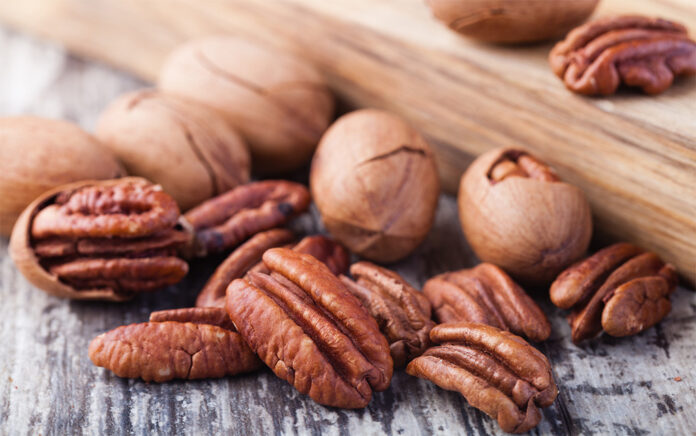Pecan nuts are one of my favourite nuts, but sadly, they are so expensive. Having dug into some more research on the amazing benefits of Pecan nuts, I quickly concluded that these beautiful nuts are worth every cent. Pecans can grow in New Zealand, but good research into which type for your area and climatic conditions will need to be done before you invest in a tree.
Pecans are the only tree nut native to North America and are also No. 1 in antioxidant concentration. When you’re on the lookout for a healthy snack, pecans check every box.
Pecans have a rich history. Wild pecans were an important part of Native American diets in the U.S. and Mexico, and the word pecan comes from the Algonquin Native American word “pacane,” which means “a nut requiring a stone to crack.”
In the wild, pecan trees live to be 1,000 years old, reaching more than 100 feet tall. The first cultivated pecan trees were planted by Native Americans, who also created a fermented beverage called powcohicora, made by fermenting pecan powder.
Today, more than 80% of the global pecan supply still comes from the U.S. It takes close to 10 years before pecan trees are able to produce a full harvest, but once they reach maturity, they can produce this nutritious food for a century or more.
Health Benefits of Pecans
Pecans have a buttery, mildly sweet flavour perfect for snacking, baking and adding crunch to salads and vegetable dishes. They also offer an impressive nutritional profile, providing protein, fibre, healthy fats and more than 19 vitamins and minerals, including vitamins A and E, B vitamins, folate, calcium, magnesium, phosphorus, potassium and zinc.
There are many reasons to add them to your diet.
- Improved cardiometabolic risk factors
Cardiometabolic risk factors such as high blood pressure, elevated fasting blood sugar, dyslipidaemia, abdominal obesity and elevated triglycerides signify an increased risk of cardiometabolic disease. This refers to a group of conditions that often begin with insulin resistance and, without healthy lifestyle changes, progress to metabolic syndrome, prediabetes, cardiovascular disease (CVD) and Type 2 diabetes (T2DM).
Only 6.8% of U.S. adults have optimal cardiometabolic health, which means the remaining 93.2% do not, instead belonging to the majority whose cardiometabolic health has been “poor and worsening” since 2000.
Simply eating pecans is one way to improve your cardiometabolic health, even if you’re overweight or obese. In a study of middle-aged and older adults who were overweight or obese, eating a pecan-rich diet for four weeks led to improvements in insulin, insulin resistance and beta cell function. The study found that eating pecans also lowered participants’ risk of cardiometabolic disease compared to the control diet.
- Reduce Oxidation of LDL Cholesterol
Pecans contain compounds such as asγ-tocopherol and flavan-3-ol monomers, which have antioxidant properties. Consuming pecans in whole or blended form led to significant increases in antioxidant defences, suggesting that “bioactive constituent of pecans are absorbable.”
Further, after consuming whole pecans, oxidised LDL decreased. Oxidised LDL is a marker of lipoprotein-associated oxidative stress and is considered to be a risk factor for heart disease. The U.S. Department of Agriculture study revealed that pecans rank No. 1 in antioxidants compared to eight other common tree nuts. Pecans also ranked in the top 20 in antioxidant capacity out of 277 foods analysed for the study.
- Improve Heart Health
With a rich content of antioxidants and monounsaturated fats, pecans are a heart-healthy food. When adults consumed a pecan-rich diet for four weeks, they experienced decreases in their LDL cholesterol and triglycerides while beneficial HDL readings increased. Further, improvements to lipid profile were achieved without any weight gain.
“Nuts such as pecans that are rich in monounsaturated fat may therefore be recommended as part of prescribed cholesterol-lowering diet of patients or habitual diet of healthy individuals,” researchers wrote in The Journal of Nutrition.
- Protect Your Brain
In an animal study of mice with a condition similar to amyotrophic lateral sclerosis (ALS), also known as Lou Gehrig’s Disease, pecans provided neurological protection. In those fed a pecan-rich diet, a significant delay was observed in declining motor function compared to mice fed a diet without pecans. This suggests eating pecans could help protect against age-related motor neuron degeneration.
Nut consumption, in general, is also inversely associated with cognitive decline. In adults aged 55 and over, those who ate more than 10 grams a day of nuts were 40% less likely to have poor cognitive function, even after adjusting for other lifestyle and behavioural factors. Surely a very valid reason to get into nuts every day.
- Cancer Protection
A systematic review and meta-analysis revealed that eating tree nuts is associated with a lower risk of cancer incidence and mortality. A dose-response relationship was found, such that the more nuts consumed, the lower the cancer risk became.
Specifically, a five-gram per day increase in total nut intake was associated with a 25% lower risk of colon cancer, a 6% lower risk of pancreatic cancer and a 3% lower risk of cancer overall. For cancer mortality, a higher intake of tree nuts led to an 18% lower risk. Extracts from pecan shells have also shown promise against breast cancer and colon cancer cell lines.
Whether you’re looking for quick, portable snack to fill you up on-the-go or a functional addition to your morning breakfast smoothie, pecans make a health-boosting choice.






